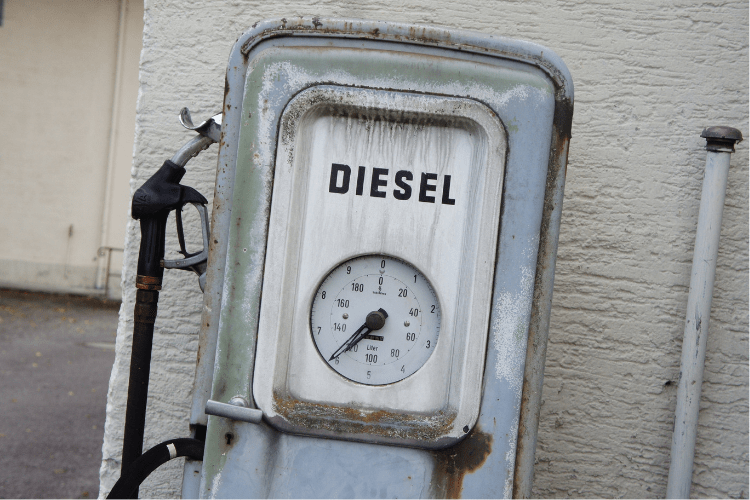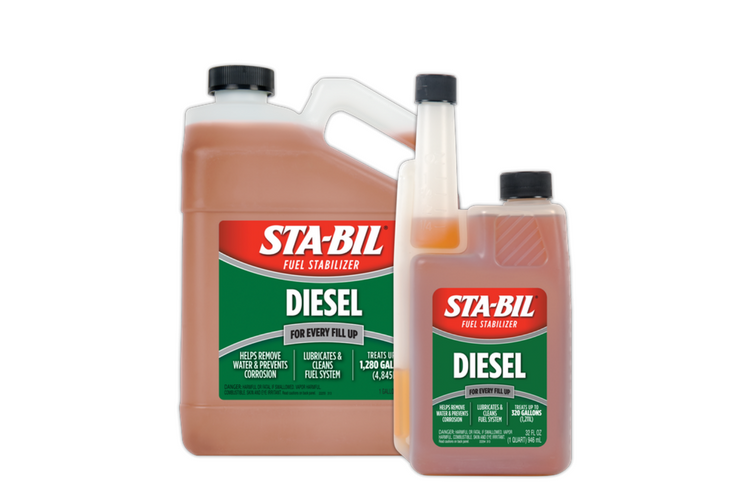How Long Can Diesel Fuel Be Stored?
Diesel fuel will not remain fresh forever. Without proper additives high quality diesel fuel can be stored safely for up to 6 months, meaning that if you have a diesel truck in storage, you will eventually need to add these additives. Diesel fuel is a carbon-based petrochemical. If left for a long period of time, the diesel will begin to oxidize, causing hydrocarbons to react with oxygen in the tank. This creates deposits that can damage fuel lines, fuel injectors, and other system components. Therefore, storage for longer than 30 days requires additives, specifically fuel stabilizers. The diesel fuel user needs to be proactive as stabilizers need to be used when the fuel is fresh. That being said it is best to add Diesel STA-BIL® when you fill up your car, car truck or equipment. These additives are recommended not only your diesel truck but also any other vehicles or pieces of equipment that are not used frequently. Remember to keep all fuel tanks full for long-term or seasonal storage, as a full tank helps prevent condensation. Bare interior tank walls will create a condition of condensation as there is air in the tank and water in the air.

Like gasoline, diesel fuel is also subject to damage without proper storage, perhaps even more so. Because diesel systems are designed differently from gasoline systems, they require a completely different stabilizer.
During storage, diesel fuel can attract moisture, which promotes growth of algae, fungus, and bacteria. In 2006, the Environmental Protection Agency (EPA) mandated that diesel fuel contain less sulfur than previous incarnations. As an environmentally-friendly measure, it was designed to create less sulfur in the air and therefore contribute to better air quality. It nonetheless made diesel fuel less stable and more likely to cause trouble without proper fuel additives. Overgrowth of bacteria, fungus, and algae gums fuel and fuel lines, causing diesel engines to run poorly, assuming they run at all. Another issue concerning diesel engines is thermal oxidation, or when fuel re-circulates throughout the engine and heats up. “Thermally stressed” fuel can result in sludge and sediment forming in the tank due to pressure and heat.
Diesel Formula STA-BIL® helps remove water from fuel; helps prevent gumming, corrosion and bacterial growth. It also helps reduce oxidation caused by thermal breakdown (from heating of the fuel).
Use Diesel Formula STA-BIL® whenever you put your diesel fuel engine or diesel equipment in storage, specifically 1 ounce for every 5 gallons of fuel. This will keep the fuel fresh for up to 1 year. If you need it to go for longer than the year, you can add a double or even a triple dosage, two add two to three years respectively. If you are using Diesel Formula STA-BIL for everyday use, then you can drop the dosage to 1 ounce for every 10 gallons of fuel.
It is essential to keep fuel systems clean and particle-free, i.e. “good housekeeping.” Dry storage conditions for the best classic cars and all vehicles are also necessary. This prevents vehicles from being exposed to high humidity, which can result in rust. As previously mentioned, it also helps prevent too much water in the fuel tank, which results in condensation in the fuel tank and the rest of the vehicle. You can store diesel fuel for longer periods of time with stabilizers.






What about diesel fuel stored in air-tight 55 gal drums? (green hi-way diesel, not farm diesel)
In article it is first stated ” Without proper additives high quality diesel fuel can be stored safely for up to 6 months, meaning that if you have a diesel truck in storage, you will eventually need to add these additives.” then later stated “If left for a long period of time, the diesel will begin to oxidize, causing hydrocarbons to react with oxygen in the tank. This creates deposits that can damage fuel lines, fuel injectors, and other system components. Therefore, storage for longer than 30 days requires additives, specifically fuel stabilizers.”
Please explain these contradictory looking sentences. Thanks!
The fuel can start going bad in as little as 30 days but may not be a major issue until around 6 months. It’s always better to be safe and treat it early though!
When you use 30 days and 6 months, is this for B5 or for diesel with no biofuel in it?
Also, if outside diesel truck is parked full of fuel part of fall or winter in a dry climate, which becomes an issue first, microbial growth or significant fuel degradation? I am trying to determine if and when a biocide is needed. I may also have very low driving for periods upto 2 months during hot summers in Colorado.
Does Sta-Bil still offer a biocide and is Sta-Bil Diesel compatible with Biobor JF?
I will be driving 2019 6.7 Ford about 40 miles every 2-3 weeks to reduce issues.